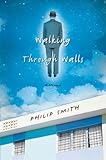 The story of Annie Cohen is a tragedy, a story of mental illness and physical disability, of family abandonment and secrets. Steve Luxenberg first discovered Annie's story when his mother mentioned having a sister to a doctor in her old age. Steve and his siblings grew up being told that their mother was an only child, so the casual mention of a sister, even one that was put in an institution at the age of two, was rather shocking. It wasn't until after his mother's death that Luxenberg discovered Annie's true identity - she had grown up with his mother, had not been institutionalized until the age of 21, when his mother was 23. But in the family history according to Beth Luxenberg, she did not exist.
The story of Annie Cohen is a tragedy, a story of mental illness and physical disability, of family abandonment and secrets. Steve Luxenberg first discovered Annie's story when his mother mentioned having a sister to a doctor in her old age. Steve and his siblings grew up being told that their mother was an only child, so the casual mention of a sister, even one that was put in an institution at the age of two, was rather shocking. It wasn't until after his mother's death that Luxenberg discovered Annie's true identity - she had grown up with his mother, had not been institutionalized until the age of 21, when his mother was 23. But in the family history according to Beth Luxenberg, she did not exist.Annie's Ghosts is Luxenberg's attempts to piece together Annie's history. He includes not only family details, but also details about the history of services to people with mental illness and mental and physical disabilities. Not only is Luxenberg trying to discover the truth about an aunt that he never knew, he is also searching to find the answer to why his mother would have kept such an enormous fact about her family a secret. He is not even sure that his father knew about Annie, or which of his mom's friends knew. Steve has to reconcile this part of his mother with the woman he knew and loved, and he begins to reconsider some family memories he himself holds.
This is a fascinating story of a single family's history, and all of the little details that tie into that history. Luxenberg reconnects with cousins he never knew, and discovers more about the tiny Eastern European village that his grandparents came from than his family had ever told him. Reading this book forces the reader to compare their own family to the Luxenbergs. Are there secrets that we know nothing about hiding in our history?








